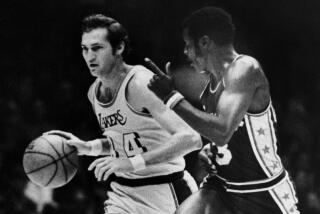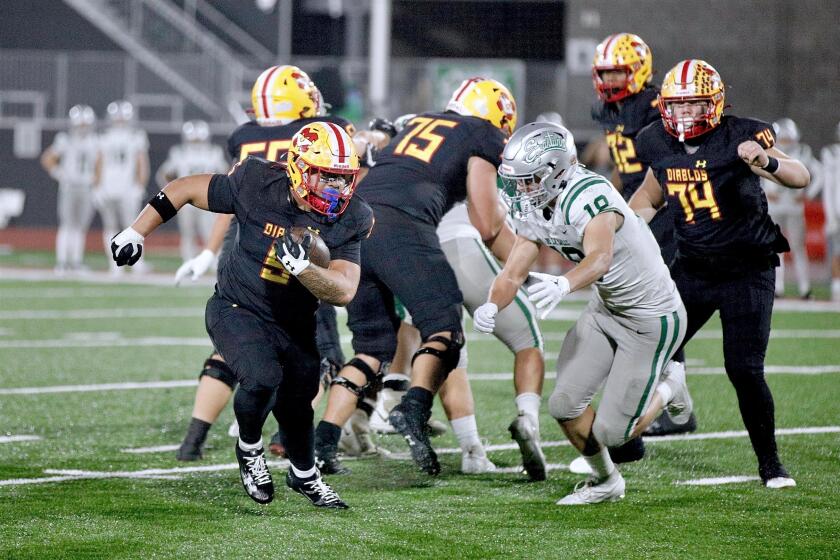Cool Sun : There Will Be No Ulcers for Paul Westphal, Who Spares the Rod but Hasn’t Spoiled His Children at Phoenix
Paul Westphal is awake!
Look, he just rose from the bench, although he doesn’t make a practice of that, stuck his hands in the pockets of his slacks and strolled up the sideline for a casual chat with a referee.
In front of the other bench, the opposing coach is growing fangs. Every time the ref calls one against him, or his players ignore another of his orders, his career flashes in front of his face. By night’s end, he’ll be an emotional wreck, unable to sleep, so he’ll watch six hours of videotape and come to practice the next morning with raccoon eyes.
Meanwhile, Westphal at 42 looks like a cherub about to venture into middle age.
His face is unlined and guileless. The coach of the Phoenix Suns has a high-pressure gig and Charles Barkley, too, but his program and his nervous system hum right along, like an elevator playing Muzak.
“That’s what’s amazing,” Sun guard Danny Ainge says. “How he’s able to maintain that poise and patience.
“Sometimes I’ve thought about coaching myself, but I’ve seen how coaches tear themselves up and beat themselves up, and it looks like they’re going to have a heart attack at the end of every game and they’re dripping sweat in the locker room after every game.
“And I go, ‘Phew, I’m not sure I want to put myself through that.’
“You look at Paul and he actually looks like he’s enjoying it. It’s the first time in my life I ever had a coach where you actually wanted him to yell more and take you by the shirt and shake you up a little bit more than he actually does.”
Paul Westphal does get upset.
Of course, if he didn’t tell you, you wouldn’t guess it.
“I have emotions,” he says. “I’m trying to win the game real hard, but to me, if I jump up and down if a player made a mistake, that makes him feel bad and makes him think I’m against him. If they’re trying as hard as they can, I don’t have any bones to pick with them. If they’re not trying, I can get all over a player, and I have.
“As far as the officials, I try to help them as much as anybody, but I don’t want to be a whiner or somebody they’re going to resent, so I try to pick my spots.
“And to me, sitting there looking calm is more like a poker player, you know, concentrating on his hand. . . . I don’t think all the jumping up and down really makes that much difference.”
And Westphal does get mad.
“I wouldn’t say, ‘go off,’ ” Ainge says of one incident. “He got mad, which is typical for most coaches.
“The next day he got us together and said, ‘Hey, I didn’t curse you guys. You guys can’t be telling the media I cursed you. We just yelled a lot and talked about what we needed to do.’
“I guess his wife was upset that the media said he had cursed.”
Anger--it’s overrated. Ask the Westphals.
*
Paul Westphal has his own style.
He likes Bob Dylan, Rush Limbaugh (“I don’t see any contradiction at all in that”) and Kinky Friedman, the former country and western singer who used to front a band named the Texas Jewboys.
Westphal says Friedman has become a spy novelist, “because he said he needed a lifestyle that didn’t require his presence.”
The greater world got its first hint that Westphal was a little different when he was a senior at Aviation High in Redondo Beach and turned down John Wooden.
It was 1968 and the Wizard, in mid-dynasty, didn’t recruit, he selected. Top preps were honored to be included, as was Westphal. Nevertheless, he chose USC.
Says Bill Walton: “He didn’t want to come to UCLA and feed the post.”
Westphal says he did it because, “I’ve always just kind of been an SC kid.” But he also liked the idea of helping to build something, himself. In his junior year, the Trojans went 24-2, losing only to the Bruins. The NCAA field, however, was only 16, and all USC got out of it was an NIT bid, which it had to decline because of Pac-8 rules.
Westphal went on to a 12-year NBA career. He was a five-time All-Star, but nothing marked him for his future career more than Game 5 in the 1976 Boston-Phoenix finals.
He had fouled out of that game and was sitting on the bench next to Sun Coach John MacLeod. The Suns, tied 2-2 in the series, trailed by one after John Havlicek had made a bank shot with a second left. With no timeouts, the Suns were to get the ball under the Boston basket.
Westphal told MacLeod to call time out, anyway.
MacLeod, grasping the logic, did. The Suns drew a technical foul, which the Celtics converted for a two-point lead.
But the Suns got the ball at halfcourt. It was inbounded to forward Gar Heard, who sank a turnaround 20-footer at the buzzer to tie the score. The Celtics ultimately won in three overtimes and took the series, but the game lives on as a classic.
After that, the NBA changed its excess-timeouts penalty.
Traded to Seattle for Dennis Johnson at 30, Westphal drifted after that. At 32, he was the comeback player of the year for the Knicks, who cut him a year later.
The Suns picked him up for a last season, but when Westphal was waived a year later, he hit the club with an arbitration case. The Suns were aghast, but under Westphal’s placid demeanor is a tenacious competitor.
Not that it did him any good in that case.
“The first year that I was out, I was hoping I’d be in,” Westphal says. “I started applying to different jobs. I could have started as an assistant a few places, but no one was offering me any head coaching jobs, in college, high school or pros.
“Until I got a job offer, a little college I’d never heard of in Phoenix . . . Southwestern Conservative Baptist Bible College. The guy who was the coach there offered me his job. I never had that happen before, so that was an offer I couldn’t refuse.
“It was only about five miles from my house, but I’d never heard of it, it was such a small little school. And I found out why he offered me his job. It didn’t pay anything and he had to make a living.
“I said, ‘What is this?’ Especially when I found out they didn’t have a gym, had like 200 students and three-quarters of them were girls. It was a great place to start. I had to do everything. I had to hire the refs, make the schedule, sweep the gym, find a gym, drive the bus--it was great. Call the newspapers, beg them to put something in there.”
The Baptists went 21-9 and Westphal moved into the big time, or the bigger time, anyway, at Grand Canyon College, another little school in Phoenix he hadn’t heard of. His team won the NAIA title in his second season.
Sun President Jerry Colangelo, impressed, took him out of general circulation, bringing him back as an assistant, even designating him publicly as Coach Cotton Fitzsimmons’ heir.
“When Paul left, it wasn’t under the best of circumstances,” Colangelo said. “But as far as I was concerned, bygones were bygones.
“I just thought Paul was a natural, although he was a little off the wall. Paul didn’t enjoy practice when he was a player. He didn’t enjoy rules and regulations when he was a player. So he’s loosey-goosey.
“What it points out to me, there isn’t any one way to do it. You can be a strict disciplinarian or loosey-goosey. I see, though, Paul isn’t as loosey-goosey as he was last year. That probably has something to do with the expectations.”
If the arranged Fitzsimmons-Westphal marriage sounded like a prescription for disaster, there was never a discouraging word in their four years. In the third, when Fitzsimmons was tired and thinking of quitting, Westphal advised him to stay.
A year later, Cotton bailed, Westphal took over . . . and Barkley arrived.
A devourer of coaches in his 76er incarnation, Barkley was looking for a regime that wouldn’t pinch him too severely. When he found it under Westphal, he swore unswerving loyalty and has, to date, lived up to it, give or take the occasional late-night barroom incident.
Westphal, according to his nature, gives his star room to roam, and everyone else, too. While Pat Riley finishes a three-hour practice, the Suns are on the back nine.
“It’s funny,” Sun assistant Scotty Robertson told the Arizona Republic during last spring’s finals against the Chicago Bulls. “A lot of times Paul will be in the huddle in a timeout, drawing up something, and I’ll tap him on the shoulder and say, ‘Hey, Paul, forget that.’
“Because Charles will already be standing on the free-throw line, paying no attention. Paul will look up, grinning, and say, ‘OK, everybody do what Charles wants to do.’
“It happened more than twice at Chicago. At times, Paul will be drawing some elaborate play and Charles will say, ‘ . . . that, get me the ball.’ ”
After the Suns had lost this season’s opener to the Lakers, they went home to play the Sacramento Kings. Before that game, Barkley erased all the diagrams Robertson had drawn on the backboard for Westphal’s pregame talk and wrote, “Let’s go kick some . . . .”
Sure enough, the Suns did.
You aren’t supposed to be able to win with sheer firepower or such a small team, but except for John Paxson’s last-second three-pointer in Game 6, the Suns would have been playing Game 7 for the NBA title on their own floor. Expectations notwithstanding, for Westphal and the Suns, it’s still a loosey-goosey world.
More to Read
Go beyond the scoreboard
Get the latest on L.A.'s teams in the daily Sports Report newsletter.
You may occasionally receive promotional content from the Los Angeles Times.










